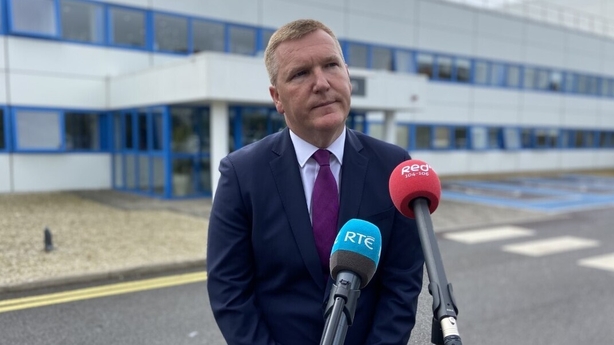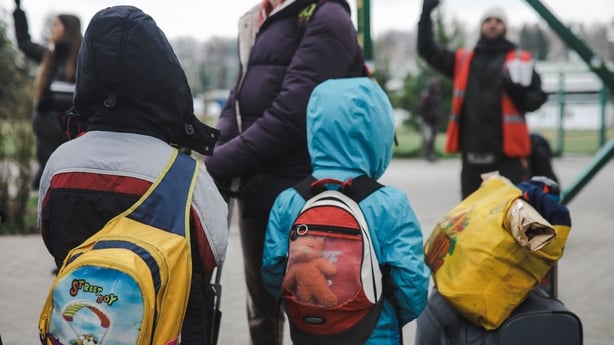RTÉ News understands that the Government is working on a proposal to increase the payment for those hosting Ukrainian families from €400 a month to €800.
This follows discussions by the three Government party leaders and senior ministers this evening.
This increased rate is also likely to be paid to those who have provided vacant homes to Ukrainians.
There is also set to be a renewed call for people to pledge accommodation for those seeking refuge here, to be overseen by local authorities.
A plan to charge people from Ukraine staying in hotels for the cost of their food was also considered this evening.
However, it is thought that this will only apply in the case of new hotel contracts, which would only cover accommodation.
The matter is expected to go to Cabinet next week.
It is also likely that more modular homes will be acquired to house those arriving here from Ukraine.
This is set to increased from 500 homes to at least 700 but it is expected that the first of these will not be in place until early next year.
Earlier, the Taoiseach said that Ireland has a legal and moral obligation to accommodate people arriving in Ireland from Ukraine.
Micheál Martin said EU countries were all in this together and one country cannot opt out.
Meanwhile, the Minister for Public Expenditure and Reform said there are "undoubtedly" pressures on the emergency accommodation system for Ukrainians which the Government will seek to address but the amount of work that is being done should also be acknowledged.
Around 43 Ukrainians have been left without State accommodation since Friday, with an overnight facility capable of hosting 200 people expected to open at Dublin Airport today.
Michael McGrath said no-one is happy that a small number of people have found themselves without accommodation in recent days but "it is a measure of how much pressure the system is under".
Speaking in Cork, Mr McGrath said "about 55,000 people have fled Ukraine and come to Ireland for protection, for safety".

"At this point in time we have issued in the order of 43,000 medical cards to Ukrainians, we have about 12,000 Ukrainian children attending our schools here, we are accommodating about 42,000 directly in state run accommodation and there is undoubtedly a set of constraints in terms of the provision of accommodation which we will seek to address," Mr McGrath said.
Mr McGrath said that today's sub-committee will be briefed by all the relevant Ministers in respect of modular housing, the refurbishment programme and the options that are open to them including pledged accommodation and the recognition payment.
But he said that with over 7.7 million Ukrainian refugees in Europe, according to the United Nations High Commissioner for Refugees, it is not just Ireland that has come under pressure.
He said: "We are doing the best we can. The Irish people have been remarkably understanding and generous in their support and we recognised that there are areas we need to do better and we need to find more accommodation to make sure people have basic shelter and support, and we will do that."
He expects the cost in the current year in provide accommodation and supports to be "in the order of €1 billion".

Around 1,200 people from Ukraine are currently seeking refuge here each week, but reached almost 1,500 per week in early October.
In addition, more than 10,000 international protection applicants have come to Ireland seeking refuge so far this year.
This compares with just under 3,762 in the first nine months of 2019, pre-Covid.
The weekly arrival figure for international protection applicants is around 300.
"We do want to provide shelter of a good standard and to met the basic needs of people coming here," Mr McGrath said.
"Some may decide to stay, but others will be here for a relatively short period of time and we just need to ensure that we look after their basic needs and today will provide a good opportunity for Government to assess the current state of play, recognise there are pressures there and see what more we can do to fill the gaps that are currently still there."
Meanwhile, the Minister for Foreign Affairs said today's Cabinet sub-committee meeting would be looking at how the State could assist more people fleeing the conflict.
Simon Coveney said it was not acceptable that those travelling from Ukraine could not find accommodation here and that more options were available.
He said the Department of Defence had some facilities that had been offered, but not yet been taken up.
And he said there could be better supports for members of the public, who might want to provide help to refugees in spare rooms or vacant properties.
The minister said, in this regard, more could be done in terms of financial supports that were available.
Labour leader Ivana Bacik said she believes Ireland has the capacity to provide adequate accommodation for refugees.
Speaking to RTÉ's Drivetime, she said it has been done in other countries "with less resources than us".
She said there is "immense pressure" on the system and a whole of Government approach is needed to address the challenge.
"It's a task of some magnitude to ensure that everyone is accommodated, whether they are refugees from Ukraine fleeing war, or others coming here seeking asylum and international protection," she said.
"Really what we want to do is ensure that there is a whole of Government approach and we want to ensure that we in opposition can also assist and support this collective effort."
She said her party is calling for the vacant Baggot Street Hospital premises, among other properties, to be repurposed to accommodate refugees.
"I think not enough is being done to bring these properties on board," she said.
Ukrainian Ambassador to Ireland Larysa Gerasko said the situation is "unacceptable".
"They bought tickets, they arrived in Ireland. So it would be better to announce the lack of accommodation in advance and Ukrainians would decide to go to another country," she said.
Lily Orlovska, an interpreter who has been working to assist refugees from Ukraine, said she had spoken to several people who were seeking a place to stay, but they all had to return to Dublin Airport as there was no space in CityWest.
We need your consent to load this rte-player contentWe use rte-player to manage extra content that can set cookies on your device and collect data about your activity. Please review their details and accept them to load the content.Manage Preferences
Speaking on RTÉ's Morning Ireland, she said they filled all the documents for temporary protection, but were told there was no space and to return to the airport and stay there "at least until Tuesday".
Those who did return to the airport slept on the floor, she said.
"They didn't have any food, any money, nothing has been given to them to support, it is just to stay in the airport," Ms Orlovska said.
She added that some people did not go back to the airport, as they did not know that they could return there, so they slept rough on the streets.
According to Ms Orlovska, some people are now reluctant to officially seek international protection in Ireland and are considering returning to other European countries, such as Germany, as they can get accommodation there.
She said that people arriving from Ukraine were surprised that there was any shortage of accommodation here.
"They were just shocked, and I could see that some of them were nearly crying because some of them just sold some of their belongings, like some property, to buy the ticket to come to Ireland through Europe," she said.
The national coordinator of the Ukraine Civil Society Forum said the Government needs to deliver a plan to create the capacity for emergency accommodation in the short-term.
Emma Lane-Spollen said there is some frustration at the situation, as it was foreseen a few months ago, but nothing was done to alleviate it.
Speaking on the same programme, she said the Cabinet meeting is important because the Taoiseach needs to be making decisions now that will create accommodation coming onstream in six months' time.
She said much more of a community-led response is needed as people are best placed to know where the vacant properties are.
"Communities know where there are old convents and schools that can be renovated, and communities need to see some benefit from people coming into their communities," she said.
Shock and disappointment over lack of accommodation
Capuchin Centre volunteer coordinator Alan Bailey said the centre provided food and showers on Friday to several Ukrainian refugees and they came back on Saturday, before returning to Dublin Airport to sleep.
Speaking on RTÉ's Today with Claire Byrne, he said the people were made to feel very welcome and they apologised to them "that maybe it all didn't live up to their expectations, but insofar as we could with our meals and medical services or hygiene services, that we give them the welcome they were looking for".
Mr Bailey said the Capuchin Centre does not have accommodation facilities "but certainly they were given the use of all the various facilities - hygiene and clean clothes".
We need your consent to load this rte-player contentWe use rte-player to manage extra content that can set cookies on your device and collect data about your activity. Please review their details and accept them to load the content.Manage Preferences
He said there was "a certain level of shock" and disappointment about the lack of accommodation
"But they're certainly appreciative of any help they were getting and a lot of them spoke of what they had left behind them and how happy they were to be here", he added.
Mr Bailey said the centre provides more than 200 breakfasts every day on a normal day.
"This morning we have over 350. We have 150 families queueing outside for nappies and baby food as I speak. So, we have a lot of services and a lot of demand", which the centre is meeting, he said.
He said the centre's founder, Brother Kevin, "always maintained that nobody should leave here hungry, and we're ensuring that that doesn't happen."
Additional reporting by Sandra Hurley and Pat McGrath







